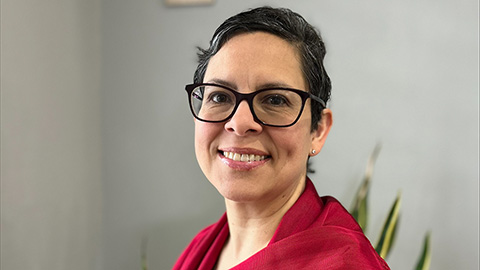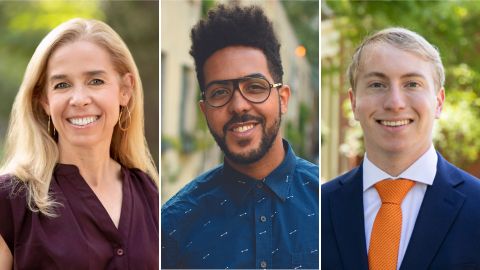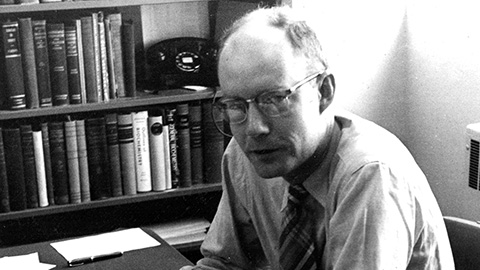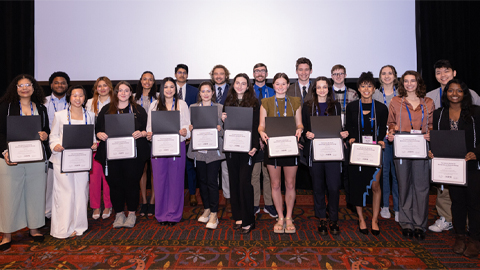Challenged by a pandemic, Harbig pursues a new approach to treating flu
When Anne Harbig found out she had won an award for her very first authored paper, she was shocked.

"It totally caught me by surprise," Harbig said. The paper was the culmination of all of her data from her Ph.D. research in Eva Böttcher-Friebertshäuser's lab at the Marburg Institute of Virology. "I always wanted to deepen my knowledge about viruses, and I was able to have this great Ph.D. project. I'm very grateful for my supervisor."
Harbig's research takes on the challenge of finding proteases that activate specific strains of influenza, which could be targeted with drugs in order to prevent infection and treat the disease. If inhibiting proteases proves effective in halting influenza infection, these methods could be used to target other enveloped viruses as well, including coronaviruses.
Harbig's project came with all kinds of challenges —wading through piles of transcriptome data, hundreds of in vitro studies with proteases that never activated, and now, the global COVID-19 pandemic that introduced all kinds of disruptions as she continues to pursue the project as a postdoc.
"Sometimes, especially on a Friday when you have the results of the week's experiments and things are not working and everything sucks," she said, "it's good to have the weekend to take a break and have ideas for how to do it differently next week."
To stop flu infection, target host enzymes
Anne Harbig seeks to develop targeted treatments that prevent influenza viruses from entering potential host cells. For a flu infection to begin, the virus must have its surface protein called hemagglutinin cleaved by host enzymes known as proteases.
"A protease is a protein, an enzyme, that cleaves other proteins at specific sites," Harbig explained.
Because the virus cannot enter a cell without a protease present, Harbig and her colleagues are identifying proteases involved in activating certain flu strains so they can develop drugs that can block them.
Harbig used RNA sequencing to search for any segments of mRNA coding for proteases found in the lower respiratory system of mice. Once she identified an array of lung proteases, each one was tested individually for its ability to split apart the hemagglutinin on the surface of influenza B viruses. The proteases that were able to do so were narrowed down further to four candidates that activated influenza B infection in mouse cells.
"The idea is, if we know the protease that activates our virus, we can use protease inhibitors to prevent infection," Harbig said. "If we know all the proteases involved, we can test the inhibitors in murine models, in vivo, and if they work there, then maybe later [we can test them] in human studies."
Harbig has earned her Ph.D. and is continuing to work on the project, hoping to see it reach human clinical trials.
Enjoy reading ASBMB Today?
Become a member to receive the print edition monthly and the digital edition weekly.
Learn moreGet the latest from ASBMB Today
Enter your email address, and we’ll send you a weekly email with recent articles, interviews and more.
Latest in People
People highlights or most popular articles

Swapping stethoscope for pipette to understand diabetic retinopathy
MOSAIC scholar Emma M. Lessieur Contreras is inspired by the work of her ophthalmologist father.

Honors for Lemon, Silva and Brownlee
Awards, promotions, milestones and more. Find out what's going on in the lives of ASBMB members.

In memoriam: Daniel Atkinson
He was an emeritus professor of chemistry and biochemistry at UCLA and a member of the American Society of Biochemistry and Molecular Biology since 1957.

Notebook scribbles to synthesis pathways
The discipline Kendrick Smith learned as a musician helps him stay focused at the bench.

ASBMB inducts new honor society members
Chi Omega Lambda, which recognizes exceptional juniors and seniors pursuing degrees in the molecular life sciences, has 31 inductees in 2024.

2024 voter guide
Learn about the candidates running for ASBMB Council, Nominating Committee, Publications Committee and treasurer.

